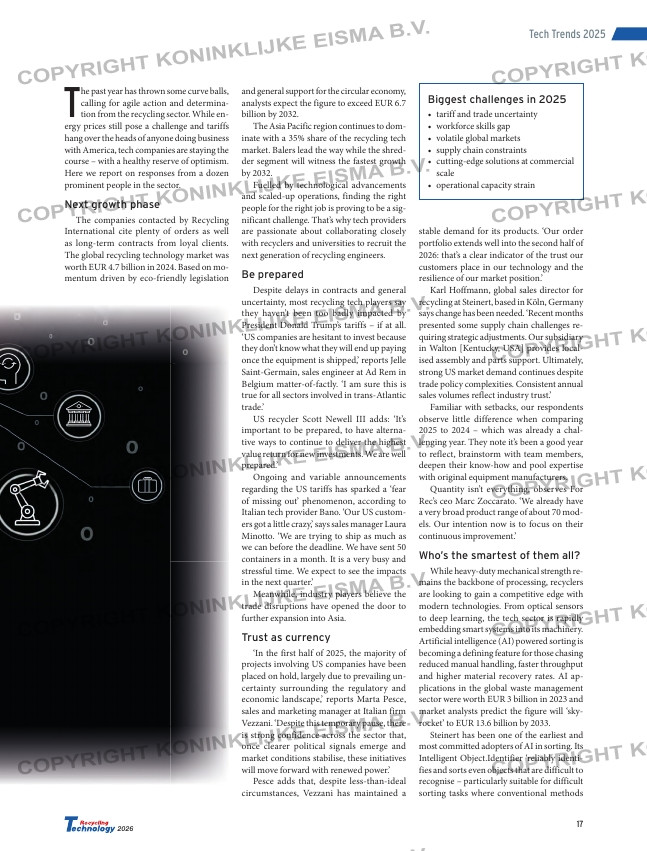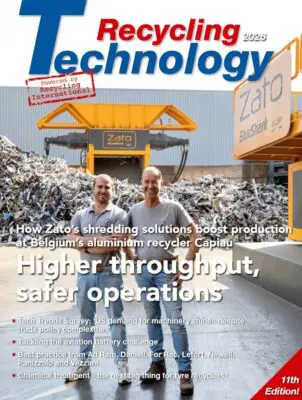Page 17 from: Recycling Technology edition 2026

17
2026
Tech Trends 2025
T
he past year has thrown some curve balls,
calling for agile action and determina-
tion from the recycling sector. While en-
ergy prices still pose a challenge and tariffs
hang over the heads of anyone doing business
with America, tech companies are staying the
course – with a healthy reserve of optimism.
Here we report on responses from a dozen
prominent people in the sector.
Next growth phase
The companies contacted by Recycling
International cite plenty of orders as well
as long-term contracts from loyal clients.
The global recycling technology market was
worth EUR 4.7 billion in 2024. Based on mo-
mentum driven by eco-friendly legislation
and general support for the circular economy,
analysts expect the figure to exceed EUR 6.7
billion by 2032.
The Asia Pacific region continues to dom-
inate with a 35% share of the recycling tech
market. Balers lead the way while the shred-
der segment will witness the fastest growth
by 2032.
Fuelled by technological advancements
and scaled-up operations, finding the right
people for the right job is proving to be a sig-
nificant challenge. That’s why tech providers
are passionate about collaborating closely
with recyclers and universities to recruit the
next generation of recycling engineers.
Be prepared
Despite delays in contracts and general
uncertainty, most recycling tech players say
they haven’t been too badly impacted by
President Donald Trump’s tariffs – if at all.
‘US companies are hesitant to invest because
they don’t know what they will end up paying
once the equipment is shipped,’ reports Jelle
Saint-Germain, sales engineer at Ad Rem in
Belgium matter-of-factly. ‘I am sure this is
true for all sectors involved in trans-Atlantic
trade.’
US recycler Scott Newell III adds: ‘It’s
important to be prepared, to have alterna-
tive ways to continue to deliver the highest
value return for new investments. We are well
prepared.’
Ongoing and variable announcements
regarding the US tariffs has sparked a ‘fear
of missing out’ phenomenon, according to
Italian tech provider Bano. ‘Our US custom-
ers got a little crazy,’ says sales manager Laura
Minotto. ‘We are trying to ship as much as
we can before the deadline. We have sent 50
containers in a month. It is a very busy and
stressful time. We expect to see the impacts
in the next quarter.’
Meanwhile, industry players believe the
trade disruptions have opened the door to
further expansion into Asia.
Trust as currency
‘In the first half of 2025, the majority of
projects involving US companies have been
placed on hold, largely due to prevailing un-
certainty surrounding the regulatory and
economic landscape,’ reports Marta Pesce,
sales and marketing manager at Italian firm
Vezzani. ‘Despite this temporary pause, there
is strong confidence across the sector that,
once clearer political signals emerge and
market conditions stabilise, these initiatives
will move forward with renewed power.’
Pesce adds that, despite less-than-ideal
circumstances, Vezzani has maintained a
stable demand for its products. ‘Our order
portfolio extends well into the second half of
2026: that’s a clear indicator of the trust our
customers place in our technology and the
resilience of our market position.’
Karl Hoffmann, global sales director for
recycling at Steinert, based in Köln, Germany
says change has been needed. ‘Recent months
presented some supply chain challenges re-
quiring strategic adjustments. Our subsidiary
in Walton [Kentucky, USA] provides local-
ised assembly and parts support. Ultimately,
strong US market demand continues despite
trade policy complexities. Consistent annual
sales volumes reflect industry trust.’
Familiar with setbacks, our respondents
observe little difference when comparing
2025 to 2024 – which was already a chal-
lenging year. They note it’s been a good year
to reflect, brainstorm with team members,
deepen their know-how and pool expertise
with original equipment manufacturers.
Quantity isn’t everything, observes For
Rec’s ceo Marc Zoccarato. ‘We already have
a very broad product range of about 70 mod-
els. Our intention now is to focus on their
continuous improvement.’
Who’s the smartest of them all?
While heavy-duty mechanical strength re-
mains the backbone of processing, recyclers
are looking to gain a competitive edge with
modern technologies. From optical sensors
to deep learning, the tech sector is rapidly
embedding smart systems into its machinery.
Artificial intelligence (AI) powered sorting is
becoming a defining feature for those chasing
reduced manual handling, faster throughput
and higher material recovery rates. AI ap-
plications in the global waste management
sector were worth EUR 3 billion in 2023 and
market analysts predict the figure will ‘sky-
rocket’ to EUR 13.6 billion by 2033.
Steinert has been one of the earliest and
most committed adopters of AI in sorting. Its
Intelligent Object.Identifier ‘reliably identi-
fies and sorts even objects that are difficult to
recognise – particularly suitable for difficult
sorting tasks where conventional methods
Biggest challenges in 2025
• tariff and trade uncertainty
• workforce skills gap
• volatile global markets
• supply chain constraints
• cutting-edge solutions at commercial
scale
• operational capacity strain
The global recycling technology market will be worth around EUR 6.7 billion by 2032.
16-17-18-19-20-21_rttrends2026.indd 17 27-08-2025 12:54



